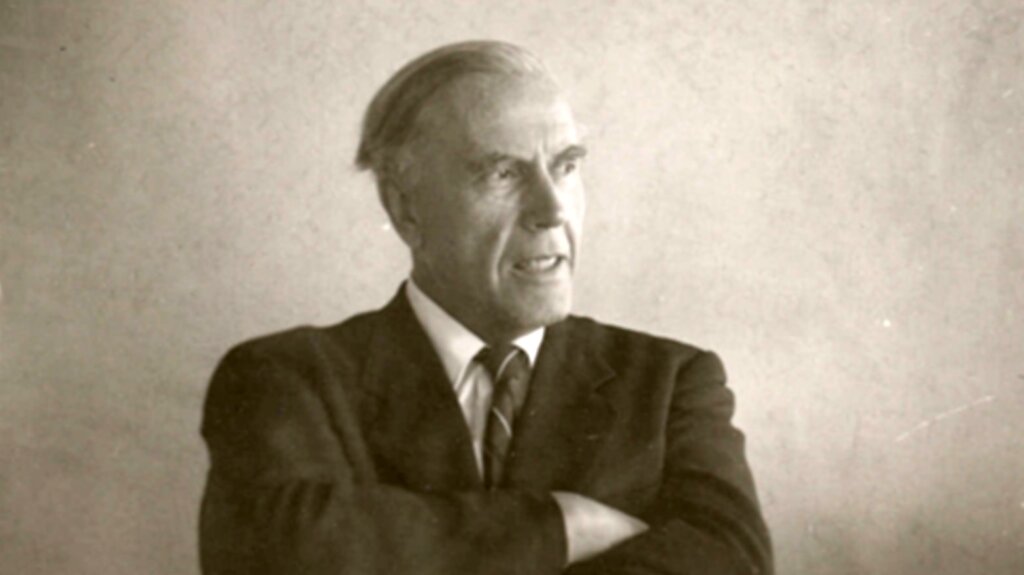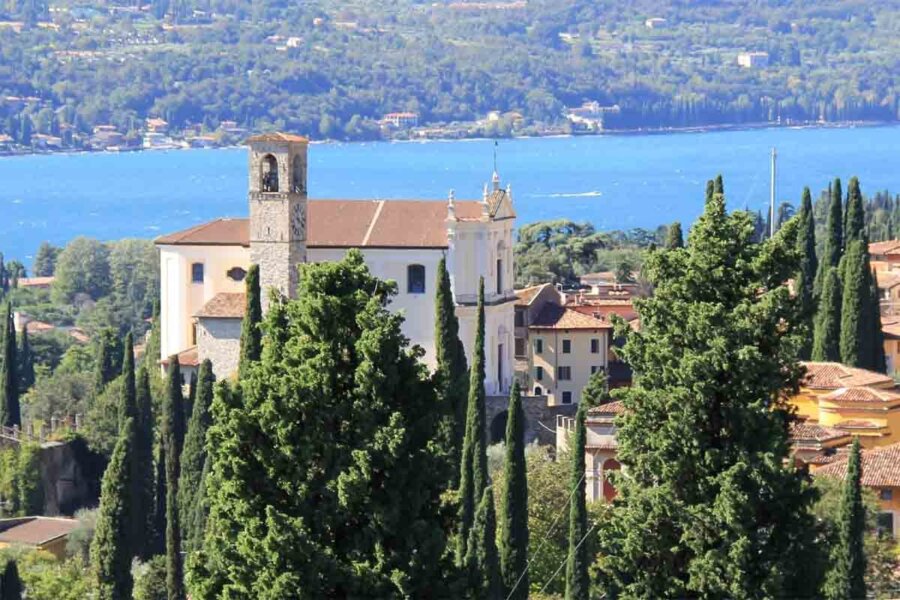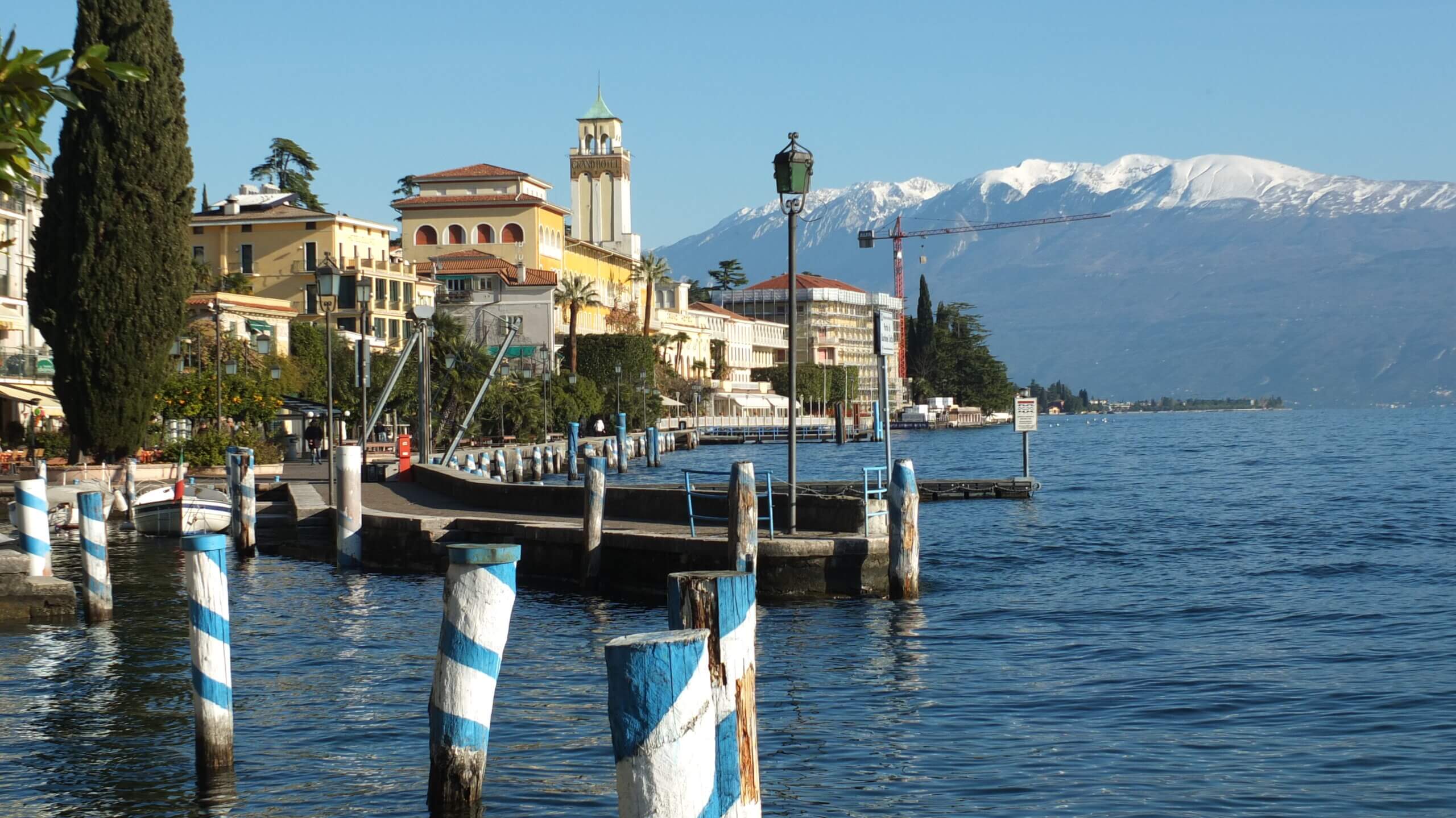Above: Gardone Riviera, Italy.
A Life-Long Guide
“When I was born,” the great nineteenth century counter-revolutionary Catholic journalist Louis Veuillot once said,
Joseph de Maistre (1753-1821) blew the trumpet and I heard it… It is necessary to place him apart… among the great men, almost among the prophets…
In my case, that trumpet blast came from the founders of the Roman Forum, the organization that I have myself been directing since 1991. A professor’s direction of my freshman undergraduate footsteps to one of its meetings at Keating Hall in Fordham University in 1970, two years after its birth, ended up providing the God-sent traditionalist “awakening from dogmatic slumbers” that changed the course of my entire life.
Who Were the Founders?
First and foremost among them was the great philosopher, Professor Dietrich von Hildebrand (1889-1977).

Born and raised in Florence, von Hildebrand converted to Catholicism with his wife in 1914 and later began his career at the University of Munich, producing seminal works on Catholic thought such as In Defense of Purity and The Metaphysics of Community (against Nazism and Communism). He was a personal friend of Eugenio Pacelli (later Pius XII), who found his work so compelling that the Pope would call him privately “the twentieth century Doctor of the Church.”
As a fierce critic of National Socialism, Nazi persecution drove Hildebrand to Catholic Austria, where, with the support of Chancellor Engelbert Dollfuss (1892-1934), he published an anti-Nazi and anti-Communist journal called Der christliche Ständestaat (“The Christian Corporate State”). This journal refuted both ideologies and promoted the traditional doctrine of the Social Kingship of Christ (especially as incarnated in Austria at the time) as the answer to the crisis of the time. He also taught at the University of Vienna, before the Nazi invasion of Austria (the Anschluss) forced him to emigrate anew. He finally settled in the United States, taking up a position at Fordham University in New York City.
It was here that he suffered the death of his wife and support, Gretchen von Hildebrand. Nevertheless it was also here that he came into contact with his fellow “founding fathers and|founding daughter” of the Roman Forum. The two other “fathers” were his Fordham colleagues – and former students – Dr. William Marra (1928-1998) and Rev. Dr. Vincent Miceli, S.J. (1915-1991). Dr. Marra, who was active on radio, television, and as an indefatigable lecturer in the United States, Canada, and Britain, was also the day-to-day director of the new organization. Equally untiring in his travel, Fr. Miceli wrote extensively on both philosophical as well as contemporary problems in the life of Church and society. So did the founding “daughter”, Dr. Alice Jordain (1923-2022), Professor at Hunter College in New York, student and then the beloved second wife of Dietrich von Hildebrand.
Why Was it Founded?
The founders were horrified by what was developing as Second Vatican Council advanced down its progressive pathway, and even more so by what took place immediately in its aftermath. Interestingly enough, the Rev. John Courtney Murray (1904-1967) also became upset with what was taking place. Dr. Marra and Fr. Miceli told me that Murray was stunned by the madness coming from the mouths of fellow Jesuits at Fordham University Faculty Council meetings, and did, in fact admit before his early death that he had exaggerated the ability of secular American culture to hold back the tide of heretical change in Catholicism. In any case, the public dissent expressed by Catholic clergy and laity even before Pope Paul VI’s encyclical letter, Humanae vitae was actually published in 1968, convinced the founders that they had to undertake a major work in defense of a Magisterium under manifold assault, which they began that same dramatic year.
At first, the plan was for the Roman Forum to operate as a “Think Tank” in union with two other participants in the same overall project. One of these was Catholics United for the Faith, which was to provide for the organization of faithful believers as supports for orthodox bishops and clergy in any number of different practical activities ranging from catechesis to general education. The other was The Wanderer, the venerable Matt Family journal that was to serve as the “paper of record” for a basically lay movement.
What altered this original goal was the Roman Forum’s decision to criticize the Missal of 1970 and work for the defense and restoration of the Traditional Roman Liturgy. Dietrich von Hildebrand was absolutely insistent upon this essential labor, and committed the organization to working together with the recently formed Una Voce International Federation, headed by Dr. Eric Vermeeren de Saventhem (1923-2005) in doing so. Given this commitment to the Traditional Liturgy, the Roman Forum now worked in close union with The Remnant Newspaper, which began to publish under the editorship of Walter Matt in 1967, who had left The Wanderer for the vigorous pursuit of the same goal.
Why a “Roman Forum”?
Perhaps the greatest tragedy of the modern world has been the presumption of an unavoidable conflict between nature and religion. Naturalists look upon the introduction of religious ideas into daily life as a death sentence for individual freedom and social progress. Many people with religious convictions are suspicious of the world around them and consider any interest in nature and human achievement to be an impossible obstacle to spiritual growth. The results, taken together, have been disastrous: “culture” that lacks both transcendence and depth; one dimensional religious perceptions; flatness, boredom, lack of poetry and purpose in all aspects of life.
A second modern tragedy has been the compartmentalization of existence. Many theologians know no philosophy; most scientists, no theology; many experts in abstract intellectual studies, little about the fine arts; most artists, or, for that matter, most people in general, nothing of the need to root themselves in the permanent things. Almost no one can place his field of study or his daily actions within a historical context. Men work at counter purposes and gain little for their efforts but a vision of shadows on the back wall of the cave of modernity.
The Roman Forum has sought to respond to this tragic situation through an active defense of the one force that can pull all of the aspects of nature and the supernatural together: Roman Catholicism. Giving it this name seemed to be a perfect symbol of our concern for the union of God’s Creation and its ultimate goal. We were Roman because we were Roman Catholic. But we were also Roman because of Rome’s nurturing of all of the classical seeds of the Logos, rational and cultural in general, as well as for its cultivating an underlying spirit of openness to other natural forces which the Faith could perfect.
The New Direction of the Roman Forum
Between 1968 and 1991 the Roman Forum worked chiefly by means of ad hoc lectures responding to current crises in Church and society. In 1977, Dietrich von Hildebrand went to his eternal reward while his widow, Dr. Alice von Hildebrand continued the same work in various capacities including publishing more books of her own and giving important interviews of great interest to the Trad movement. The Roman forum was led by Dr. Marra.
However, by the time I took over the leadership of the organization in 1991, both Dr. Marra and myself realized that these admittedly valuable conferences were nevertheless somewhat disconnected, thereby partly obscuring their ultimate purpose. The Forum decided that a successful fulfillment of its stated task demanded dedication to a systematic teaching of the True, the Good, and the Beautiful—one that ignored neither the particular nor the whole picture of knowledge, the arts, and life in general—within a more broad and structured historical framework. It also concluded that at least part of this systematic training had to be given in an environment which, by its history and development, was more congenial to the Catholic love of Faith, Reason and the hierarchy of values than an America which, besides being secularized in its contemporary practices and beliefs, was Protestant and Enlightenment in its origins.

This broader, historically-focused and international program was inaugurated on February 23rd, 1992, the Solemnity of the Chair of Saint Peter in Antioch (now the Forum’s patronal feast), with a Solemn Pontifical Traditional Mass (the first in the mainstream Church since the liturgical revolution), celebrated by His Eminence, Alfons Maria Cardinal Stickler, former Prefect of the Vatican Library.
This new approach involves several projects. The New York City Church History Lecture Series offers an in-depth discussion of consecutive periods in the life of Christendom each year from September through May. Texts that we encourage students to read along with this program include Werner Jaeger’ Paideia (Oxford, Three Volumes, 1986); Early Christianity and Greek Paideia (Harvard, 1961); Emile Mersch’s The Whole Christ (Dennis Dobson, 1936); and George de Lagarde’s La naissance de l’esprit laique au declin du moyen age (Nauwelaerts, Five Volumes, 1958).
Meanwhile, the Gardone Summer Symposia in northern Italy carry on that more systematic study in a full Catholic spiritual, intellectual, historical and social environment in a different way each July. Allow me to speak in a bit more detail about these gatherings, whose spirituality is rooted in understanding and cultivating the full consequences of the Incarnation for personal and social life already alluded to above.
The Importance of the Gardone Retreats
We live in a world of committed and indeed often unremitting ugliness and vulgarity. “Retreats” emphasizing the reality of the underlying beauty of a fallen nature that is nonetheless capable of redemption ought to be seen as a restorative measure reinforcing commitment to the Catholic message. This is both a reteat to escape Modernity’s perpetual assault on the senses as well as to live for several weeks in an atmosphere of Catholic joy reminding us how man can use the things of nature for the greater glory of God. What kind of teaching do we offer to hideous Modernity if we treat such an opportunity as though this were a shameful and perhaps even cowardly temptation?
To paraphrase the statement of Prosper of Aquitaine which the Roman Forum uses as its motto –
Even if the wounds of this shattered world enmesh you, and the sea in turmoil bears you along in but one surviving ship, it would still befit you to maintain your enthusiasm for Catholic culture unimpaired. Why should the full fruits of Catholic civilization be disdained if transient things fall?
To give such an impression would be tantamount to saying that we are embarrassed by the full fruits of a culture we claim we are fighting to revive; tantamount to treating the Protestant understanding of the total depravity of nature as the “realistic” one; tantamount to arguing that the spiritual and mental health of activists engaged in the battle for the Faith can only be maintained by a life long imprisonment in a Hobbesian zoo constructed by our enemies.
The full purpose of the annual Gardone venture is to introduce men and women who are forced (by their Protestant-Enlightenment environment) to live an atomistic way of life (which is harmful to Catholic culture) to a different kind of existence; to life in a microcosm of what we once called Catholic Christendom; life in a world which took for granted the central role of both supernatural and natural community for the development and perfection of the individual. The Summer Symposia promote a community life of supernatural and natural character in every conceivable manner. It is encouraged through common participation in the Traditional Liturgy; through common dining, singing, story telling, and camaraderie at table each evening; through common physical proximity in the “neighborhood” created by the piazza and the hotels that we make our own each summer. The general value of this communal experience is, once again, taught by all of Greco-Roman-Catholic civilization. Our forbears, both secular and religious, understood that life in community makes us aware of insights, merits, and, perhaps most importantly, flaws in our thinking and behavior that lie unexposed when we are trapped in the atomistic life created by Protestant-Enlightenment teaching.
One does not need years to grasp the benefits of this communal experience. The contrast, after the fact, of the impoverished existence guaranteed by Modernity with the “time out of time” of this short, Catholic communal experience creates an impact on the mind and soul that lasts forever. This is why we also give enthusiastic support to Michael Matt, the current editor of The Remnant Newspaper – with which the Roman Forum remains firmly united – in his organization of the Our Lady of Guadalupe Chapter for the annual Chartres Pilgrimage of Notre Dame de Chrétienté. That Pilgrimage offers the same “time out of time” experience, on behalf of the same overall project, although in a quite different spiritually uplifting manner.
Many of the New York City Church History Lectures, as well as those from the Gardone Summer Symposia have been preserved, and are still available through Keep the Faith (www.keepthefaith.org), founded by the late and very great lay apostle, Howard J. Walsh (1939-2023). Others can be found on Sound Cloud.
This Summer
Our thirtieth annual Gardone Symposium takes place from July 6 to 17th and is entitled “Christianity and Paganism: Old and New.” As the great Hilaire Belloc put it:
The Old Paganism was of a sort that would be open, when due time came, to the authority of the Catholic Church. It had ears that at least would hear… Men do not live long without gods; but when the gods of the New Paganism come they will not be merely insufficient, as were the gods of Greece, nor merely false; they will be evil. One might put it in a sentence and say that the New Paganism, foolishly expecting satisfaction, will fall, before it knows where it is, into Satanism. (Hilaire Belloc, Essays of a Catholic, 1931)
Faculty, clergy and musicians include Dr. Miguel Ayuso Torres of the Universidad Pontificia Comillas, Madrid; Dr. Thomas Pink (King’s College, London)
Clemens Cavallin (Religious Studies, Sweden); Sebastian Morello (Essays Editor and Columnist, The European Conservative); OnePeterFive’s own contributing editors Dr. Peter Kwasniewski and Dr. Joseph Shaw; Dr. Thomas Pink (King’s College, London) as well as Fathers Fr. Edmund Waldstein (Philosophisch-Theologische Hochschule, Austria), Fr. Gabriel Díaz-Patri (Studia Liturgica, United Kingdom), and Rev. Dr. Richard Munkelt (Chaplain of the Roman Forum).
Our liturgical schedule will include daily Mass and Vespers, and the talks will cover these themes:
1) Ancient Paganism and Modern Naturalism: Similarities and Differences
2) The Pagan State and Social Establishment
3) Pagan Warfare: Ancient and Modern
4) Pagan Slavery: Ancient and Modern
5) Pagan Child Sacrifice: Ancient and Modern
6) Paganism and the Sexual Realm: Ancient and Modern
7) Gnosticism and Paganism: Ancient and Modern
8) Sophism and Paganism: Ancient and Modern
9) Mystery Religions and Paganism: Ancient and Modern
10) Ancient Paganism, Magic, Astrology, Alchemy, and the Kabbala
11) St. Justin Martyr, St. Clement of Alexandria, St. Augustine and the Ancient Pagan World
12) Christian Missionaries and Global Paganism
13) The Renaissance and the Return and Transformation of Paganism
14) The Magical-Alchemical-Kabbala–Gnostic Vision, Francis Bacon, and the Modern Scientific/Science Fiction Project
15) The Pagan State, Social Establishment, Warfare, Slavery, Sexual Outlook Reborn and Transformed
16) Rock Culture, Modern Theater, Liturgy, and Paganism
17) Satanism, the Contemporary Elite, the Posthumanist Dream, and Living Hell
For more information, click here.


